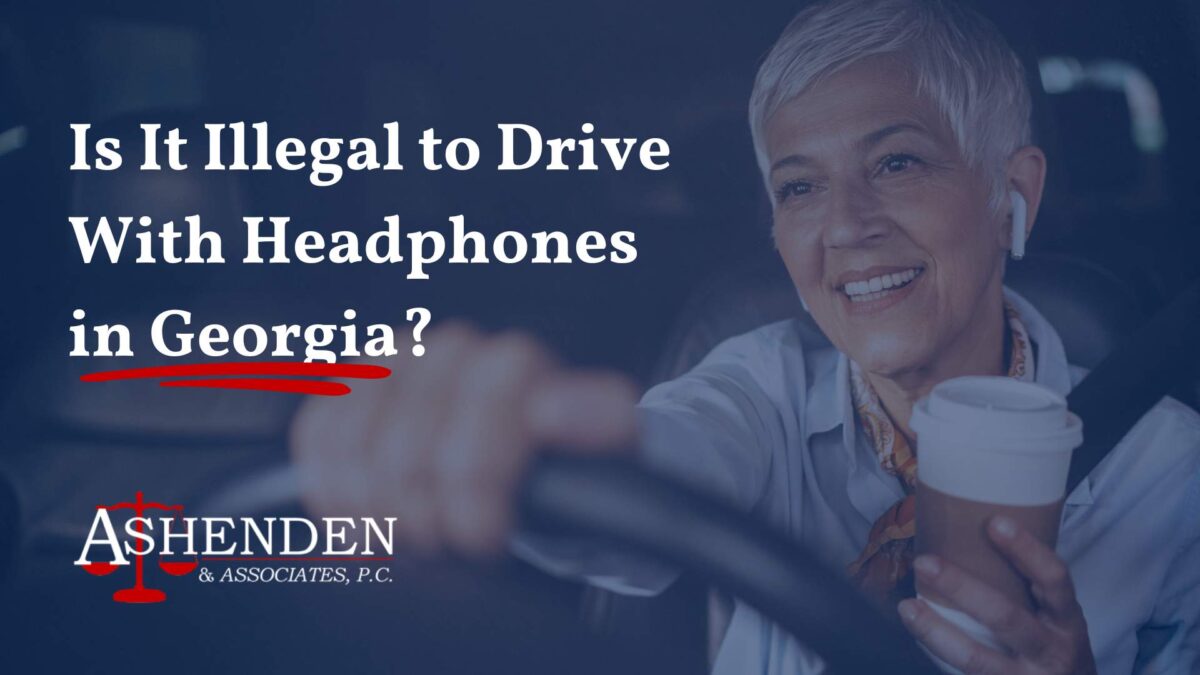When it comes to driving habits, there are numerous forms of distracted driving that individuals may engage in. Driving while wearing headphones is definitely a common habit, especially now that Bluetooth earbuds are popular smartphone accessories. While this practice is legal in many states, its legality can vary. In Georgia, the laws surrounding this form of distracted driving are specific and must be understood clearly in order to avoid car accidents, fines, and penalties. Below, the Sandy Springs car accident attorneys at Ashenden & Associates answer the common question: Is it illegal to drive with headphones in Georgia?
If you have been injured by a distracted driver on the roads in Georgia, you need a Sandy Springs personal injury attorney on your side. Contact Ashenden & Associates at 770-394-8909 today to schedule a free consultation and explore your legal options in the wake of a distracted driving accident.

What is Distracted Driving?
Distracted driving is a major concern on the road, as it significantly increases the risk of accidents nationwide. It involves any activity that diverts attention from driving, and can be categorized into three main types:
- Visual Distractions: These distractions take the driver’s eyes off the road. Examples include looking at a GPS device, observing a roadside incident, or reading a billboard.
- Manual Distractions: These involve taking one’s hands off the steering wheel. Examples include eating, adjusting the radio or climate controls, and texting on a mobile phone.
- Cognitive Distractions: These distractions take the driver’s mind off driving. Examples include daydreaming, highway hypnosis, engaging in deep conversations with passengers, or being preoccupied with personal issues.
Each of these distractions can reduce a driver’s ability to maintain focus and react promptly to road conditions or hazards, thereby increasing the likelihood of accidents. Understanding and avoiding these distractions is crucial for safe driving.
Is It Illegal to Drive With Headphones in Georgia?
In Georgia, the legality of wearing headphones while driving is a nuanced issue. Technically, it is legal to drive with headphones, but this permission comes with specific limitations. Georgia law allows the use of headphones solely for communication purposes, such as using a Bluetooth headset for phone calls. However, using headphones for musical or entertainment purposes while driving is not permitted. This distinction is important for drivers to understand to ensure they remain within the boundaries of the law.
The parameters governing the use of headphones and other phone-related activities while driving are largely set by the Hands-Free Georgia Act. This act, a cornerstone in Georgia’s traffic safety laws, has established the majority of the recent guidelines regarding the use of electronic devices in vehicles, aiming to reduce distractions and enhance road safety.
Hands-Free Georgia Act
The Hands-Free Georgia Act, officially known as House Bill 673, was a significant legislative step taken by the Georgia General Assembly and was signed into law by Governor Nathan Deal. Coming into effect on July 1, 2018, this new law brought forth a set of comprehensive rules regarding the use of phones and other electronic devices by drivers. Under this law, drivers are prohibited from holding a phone or using any part of their body, such as their shoulder, to support it. Cell phone usage for making or receiving calls is permitted only through hands free devices like speakerphone, earpiece, wireless headphone, in-vehicle audio systems, or electronic watches. GPS navigation devices are also allowed under the Act.
The law specifically states that drivers can only wear headphones while driving if they’re doing so for communication and not for listening to music or other forms of entertainment. It further restricts drivers from sending or reading any text-based communications, including emails, social media, and other internet content, unless it involves voice-based communication that converts messages into audio or is used for GPS navigation. Watching videos is confined strictly to navigation purposes, and recording videos is not permitted while driving, with the exception of continuously running dash cams.
Exceptions to the Hands-Free Georgia Act
While the Hands-Free Georgia Act imposes strict rules to minimize distractions for drivers, there are specific exceptions where the use of a handheld device is permitted.
These exceptions include situations where a driver needs to report critical and urgent conditions such as a traffic crash, medical emergency, fire, criminal activities, or hazardous road conditions. Furthermore, employees or contractors of utility service providers are allowed to use handheld devices when acting within their employment scope, especially while responding to utility emergencies. Additionally, first responders, which include law enforcement officers, firefighters, and EMS personnel, are exempt from these restrictions during the performance of their official duties.
It’s important to note, however, that these exceptions are not applicable when the vehicle is stopped in traffic, such as at traffic signals or stop signs. The only time a driver can legally use a handheld device without these specific conditions is inside a lawfully parked vehicle.
Penalties for Wearing Headphones While Driving in Georgia
Under Georgia law, if a driver is caught wearing headphones by a police officer, they can face the following penalties:
- First Offense: $50 fine and one point on their license.
- Second Offense: $100 and two points on their license.
- Third and Subsequent Offenses: $150 fine and three points on their license.
Other States That Allow Driving With Headphones
Georgia is not the only state that allows people to wear headphones while driving. Other states that legalize this hands-free driving habit include:
- Alabama
- Arkansas
- Connecticut
- Delaware
- District of Columbia
- Hawaii
- Idaho
- Indiana
- Iowa
- Kansas
- Kentucky
- Maine
- Michigan
- Mississippi
- Missouri
- Montana
- Nebraska
- Nevada
- New Hampshire
- New Jersey
- New Mexico
- North Carolina
- North Dakota
- Oklahoma
- South Carolina
- South Dakota
- Tennessee
- Texas
- Utah
- Vermont
- West Virginia
- Wisconsin
- Wyoming
Meanwhile, only a handful of state laws make it illegal to wear headphones while driving, including:
- Alaska
- California
- Illinois
- Louisiana
- Maryland
- Minnesota
- Rhode Island
- Virginia
- Washington
Why is it Dangerous to Drive With Headphones?
Although Georgia law states that wearing headphones while driving is permitted in certain circumstances, it’s still a dangerous driving habit that can lead to traffic fatalities and injuries.
Driving with headphones poses significant risks, primarily due to the sensory isolation it creates, which can lead to distracted driving accidents. These dangers include:
- Reduced Environmental Awareness: Headphones can block or significantly diminish the sounds of traffic, emergency vehicles, and other crucial auditory signals that are essential for safe driving.
- Delayed Reaction Times: Being engrossed in music or a conversation through headphones can slow a driver’s reaction time to sudden changes in traffic conditions or unexpected road hazards.
- Cognitive Overload: Multitasking while driving, such as focusing on audio input from headphones while processing visual information on the road, can lead to cognitive overload, impairing decision-making abilities.
The consequences of distracted driving accidents can be severe, often resulting in various types of injuries, including:
- Whiplash and other neck injuries
- Spinal cord injuries
- Head injuries, including concussions
- Broken bones and fractures
- Lacerations and bruises
- Seat belt syndrome
- Internal injuries
- Psychological trauma such as PTSD
- In severe cases, fatalities
These injuries not only cause immediate harm but can also have long-lasting impacts on the victims’ lives, including chronic pain, disability, and financial strain due to medical bills and lost wages. This underscores the importance of avoiding distractions like headphone use while driving, to ensure the safety of all road users.
If you have suffered any of the aforementioned injuries due to a distracted driver, schedule a free consultation with Sandy Springs whiplash attorneys, Sandy Springs traumatic brain injury attorneys, and Sandy Springs spinal cord injury attorneys today.
Can You Sue for a Distracted Driving Accident?
If you are involved in an accident caused by a distracted driver, you have the right to sue for damages, and a Sandy Springs auto accident attorney can help you do so. Proving negligence in car accident claims is a critical component of such legal action. To establish the negligence of the other driver, the following elements must be demonstrated:
- Duty of Care: Every driver has a legal obligation to operate their vehicle in a manner that is safe and adheres to traffic laws, thereby ensuring the safety of other road users. This is known as the duty of care.
- Breached Duty of Care: You must prove that the driver failed to uphold this duty. In the context of distracted driving, using headphones or engaging in other activities that divert their attention from driving can be seen as a breach of this duty.
- Causation: It’s essential to demonstrate that the driver’s breach of duty directly caused the accident. This means showing a direct link between their distracted driving and the incident.
- Damages: Finally, you need to prove that the accident resulted in quantifiable damages. This includes physical injuries, property damage, medical expenses, lost wages, and other related costs.
By successfully proving these elements with the help of an experienced Sandy Springs personal injury attorney, you can establish the other driver’s negligence and thereby seek compensation for the injuries and losses you have suffered due to their distracted driving.
You may be wondering: is Georgia an at-fault state? Yes, and because Georgia is an at-fault state, accident victims can recover compensation for their losses through the other driver’s insurance company, but in cases where the damages exceed the insurance policy amount, civil action may be necessary. In any case, it’s important to consult with our experienced legal team to ensure you obtain the justice and compensation you deserve.
Car Accident Damages
When you’re involved in an accident with a driver wearing headphones, the range of damages you can claim is extensive. These damages are not only meant to compensate for immediate losses but also to address the long-term consequences of the accident. The types of damages typically include:
- Medical Bills: Covers all medical treatments related to the accident, including emergency services, hospitalization, surgery, medication, and rehabilitation.
- Lost Wages: Compensation for the income lost due to time away from work, including future lost earnings if the injury affects your ability to work long-term.
- Property Damage: Reimbursement for repairs or replacement of your vehicle and any other personal property damaged in the accident.
- Pain and Suffering: Compensation for physical pain and emotional distress caused by the accident, which can include anxiety, depression, and reduced quality of life.
- Loss of Consortium: In cases where injuries impact relationships, compensation can be sought for loss of companionship or affection.
It’s important to note that the specific damages available can vary depending on the circumstances of each case. Consulting with our knowledgeable attorneys, who specialize in distracted driving accidents, is crucial in accurately assessing and pursuing the full extent of damages to which you are entitled.
Call a Sandy Springs Personal Injury Lawyer at Ashenden & Associates Today
If you’ve been involved in a car accident in Sandy Springs or the surrounding areas, especially one involving headphone usage by a distracted driver, it’s crucial to seek experienced legal representation from a personal injury lawyer. At Ashenden & Associates, we are dedicated to helping victims navigate the complexities of their car accident claims. With our expertise in handling cases involving distracted driving, we can provide the guidance and support you need to pursue the compensation you deserve.
Don’t navigate the aftermath of an accident alone. Call Ashenden & Associates today at 770-394-8909 to schedule a free consultation.
